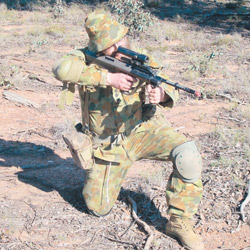Rabbi Gutnick follows a family tradition as military chaplain
RABBI Dovid Gutnick had to undergo army field training on the way to becoming a Jewish military chaplain.
NAOMI LEVIN
JEWISH Australian soldiers will be better catered for with Rabbi Dovid Gutnick officially being inducted into the chaplaincy ranks.
Rabbi Gutnick, the rabbi of East Melbourne Hebrew Congregation, was toasted at a small function earlier this month hosted by Rabbi Ralph Genende, the senior rabbi to the Australian Defence Force (ADF) and attended by Rabbi Yossi Segelman, also an ADF chaplain.
Rabbi Gutnick is following a family tradition, with his father, Rabbi Mordechai Gutnick, having previously held the role.
Australia’s highest-ranking Jewish military officer, Major General Jeffrey Rosenfeld, paid tribute to the role chaplains play in the ADF.
Major General Rosenfeld, who has seen active service as a surgeon in Iraq, Rwanda and East Timor, Bougainville and the Solomons, said chaplains provide support and can help with soldiers’ mental health issues.
“Soldiers know they can go and speak openly to a chaplain and it will be a confidential matter,” Major General Rosenfeld said.
On a personal note, he said he had always enjoyed the company of a military chaplain, no matter which religion they belonged to.
“The doctors and the chaplains seem to form a close alliance in the unit,” he said. “We have a very responsible and very unique role in the unit and we do have some things in common as chaplains and doctors.”
In addition to ADF and Jewish community representatives, Yvonne and Felix Sher also attended the celebration for Rabbi Gutnick’s induction.
The Shers are the parents of Private Greg Sher, who was killed in action earlier this year in Afghanistan.
Diary from a rabbi at Duntroon
Day 2: Saturday morning
IT is my first morning in Duntroon and I’m starting to show some signs of cracking already. There is this big sergeant up ahead yelling totally unintelligible commands. “Arrf arruf arrf arruf.”
I’m sure nobody knows what he’s talking about, yet I’m the only one out of step with the march. I desperately do a quick jig to get back into step.
“Rabbi, you’re not auditioning for Riverdance,” Sergeant A yells in my direction. “And pick up your head and stare the rain in the eye. How you gonna be when there are bullets whizzing past your nose?”
How come I wasn’t warned about this? Did my father do this when he was an army chaplain? Somehow, I don’t think so.
Day 5: Tuesday morning
TO date I’ve managed to squeeze my daily prayers into the allotted break times. I’ve also been pretty private with my prayers. Only my roommate has observed me praying and is careful to give me a wide berth when I’m adorned with my tallit and tefillin.
This morning, however, there is a break in protocol. Robby, an intelligent if not slightly eccentric bloke, has been observing me keenly for several days. Yesterday he enquired about my “hamlukah”.
Today he has noticed me in tallit and tefillin through the open door of my room. I hear him talking excitedly in the hallway. “The rabbi’s wearing this black torch on his head, give me another look, will ya?” he pleads with my roommate.
Day 8: Friday evening
CAPTAIN B has taken it as his personal responsibility to ensure I get up to the training complex before Shabbat, as the rest of the course participants will be travelling there tomorrow morning on buses.
Friday evening away from all the angry sergeants and inquisitive trainees is most blissful.
I make kiddush and share “war stories” with Captain B. I listen to his recent experiences in Iraq and Afghanistan and I tell him some of my experiences growing up as an Orthodox Jew in Australia.
In the evening, a digger of New Zealand origin asks with some scepticism as to why I had to come down earlier than everyone else. Surely there were no cars around when Moses got the Bible? Captain B answers with perfectly acceptable talmudic logic: “The principles are timeless. It’s the application that varies depending on the era.”
Captain B has well and truly passed the test and is added to my ever-expanding list of righteous gentiles.
Day 13: Wednesday evening
WE are preparing to go bush for the last few days of the course. It dawns on me that the metal containers on the army webbing used for heating up rations are not new and therefore need kashering via the method of hagalah (boiling water).
For about an hour I sit outside my room, feeding these white hexamine tablets into a feeble and wholly ineffective fire.
“Rabbi, I’m not sure what it is you’re trying to do, but whatever it is, it ain’t working,” comments Sergeant A.
After an abridged summary of the laws of kashrut, Sergeant A interrupts me.
“Hold that thought, rabbi” and dashes off. A minute later he’s back with this massive jet burner in his hand. “This is how we kasher things around here, baby!”
Day 15: Friday evening
THIS is going to be the hardest Shabbat yet. My section has divided my items among themselves so that I don’t have to carry anything on Shabbat. The laws of carrying on Shabbat state that an eruv will not be effective if there are large amounts of uninhabited forest land within the fence. So I can’t carry anything at all.
Day 17: Sunday afternoon
TO conclude the course, two warrant officers debrief us and ask us for feedback on the course. I let them know how well my religious needs have been attended to and thank them.


comments